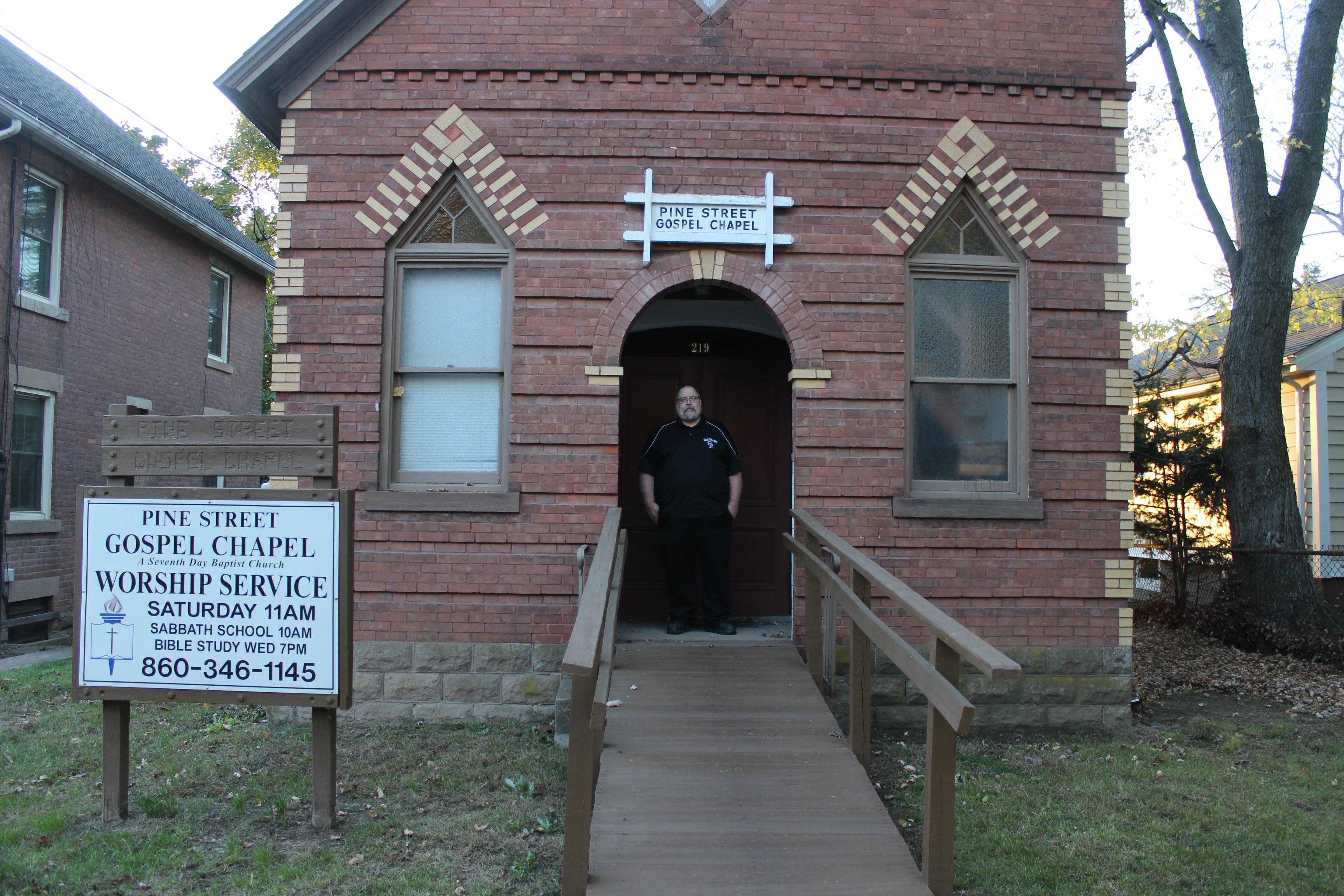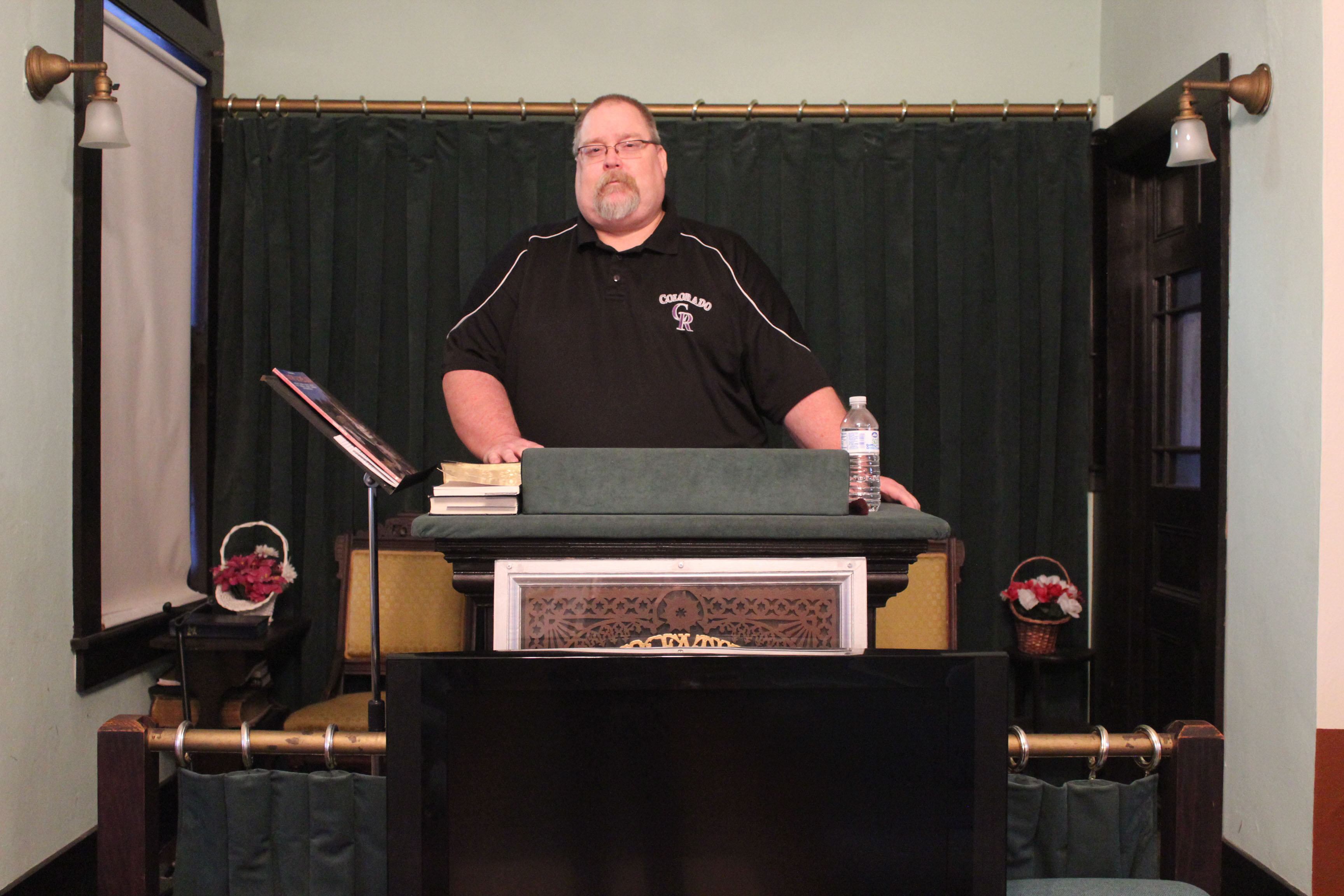
The most active three-block radius on Saturday nights encompasses Warren Street, Pine Street, and Fountain Avenue. Parties can be found on “Fountain” most weekends, Wednesdays for Bar Night, and Thursdays for those who don’t have class Friday morning. Or, if you’re adventurous, the 8:50 seminar won’t stop you from touring Fountain on a Thursday night.
But there is another attraction, too: a small church on Pine Street, aptly named Pine Street Gospel Chapel. To the naked eye, the chapel passes as a small house with a sign in front, which is probably why most people don’t even know it’s there. But on one of my first nights at Wesleyan, parading around Fountain like any freshman during the first week of college, I spotted the little chapel. I pointed it out to my friends, and we laughed at the strange building. Yet I wondered: Who actually attends this church? And why is it still here when all of the surrounding houses are host to the most sinful parties virtually every night?
Over the course of a few days, I called the phone number found on the wooden sign outside the chapel to no avail. So, on a chilled and cloudy Saturday morning in October, as some make their walks back to their dorm room after a night on Fountain, I went to church.
I have not been to many churches in my life, and those that I have attended have always had some sort of robust foyer with large and intimidating ceilings. But when I open the door to the chapel one Saturday morning, I immediately walk in on a service and make direct eye contact with the pastor who is, at this moment, delivering a sermon. I make a split-second decision to just sit down and listen rather than leave.
Pastor David Thorngate is a large man with a buzzed head and a goatee that must have, at some point, belonged to someone in an Old Western film. He stands tall and powerful behind a podium. Above him are the words, “Thy Word is Truth.” To his right are the Ten Commandments, above an American flag.
The chapel can fit maybe 50 people and contains rows of green chairs that look like they should be in a waiting room rather than a church. Sitting in the first row is the pastor’s wife (whose name I was never told nor could I find on the church’s website), and including her, Pastor Dave, and myself, there must be 15 people in attendance. I am, by far, the youngest person in the room. That is, until, a young family with a toddler comes in.
I watch in awe as the pastor plays guitar and his wife sings with a heavenly voice, and suddenly an elderly woman with a beaming smile appears next to me, holding a pamphlet out for me to take.
Afterwards, there is a brief reading from the King James edition of the Holy Bible. I am unsure of what to do until a Bible seems to appear out of thin air in front of my face; upon turning around, I discover it came from the woman behind me, also smiling.
The pastor begins to speak of people who are currently going through hardships. After investigating the pamphlet I was handed, I discover that he is speaking on members of the church who are not currently in attendance, due to sickness, and says that we will surely pray for their safety. He opens the prayer up to the congregation and asks if anyone has someone in particular that they would like us to pray for.

An elderly man begins to speak on American troops in Iraq and our ongoing efforts to stop ISIS. Because of the election season, I worry that he is planning to go on some sort of long political rant about how one candidate is going to help us defeat ISIS. However, I am quickly corrected. He merely discusses his concerns for our troops, and how he hopes for their safety and the safety of all Americans. I am gleefully surprised that, although he is speaking on a very political subject, he does not mention his political preference at any point.
Shortly afterwards, a woman speaks up and says that she wishes to pray for America. She briefly expresses concern for the state of our country with the election coming up. And, almost immediately after, the old man speaks up again and says that he wishes to pray for the hearts of Americans. He says that there is far too much hate in the country, and that he hopes with the upcoming election, Americans will finally be at peace. And together, we pray.
Before that Saturday sermon, I had never felt so peaceful with a group of strangers in my life. I was vastly younger than any of them, and my trashy sweater, black jeans, and Timberlands would look very silly next to any of them. They were caricatures of quaint New England living. They were unbelievably excited that a student had attended and begged me to come back if I could. I wondered if they knew just how many people would be drunk in the surrounding area in about 12 hours.
A few days later, I come back to have the chance to speak with Pastor Dave, who is one of the jolliest people that I have ever met in my life. After a brief chat about how much I enjoyed his sermon, I ask him to give a brief history on the church.
He tells me that the church was built in 1911 (or, sometime around then; it’s unknown when it was actually finished). Dave has been the pastor for about 10 years and lives about a block away from the Wesleyan Center for the Arts. The church recently celebrated its “Over One Hundredth” anniversary. He tells me that it belongs to the Seventh-Day Baptist denomination, which, I find out, is a rather conservative sect of Christianity.
“Seventh-Day Baptists’ determined belief is the Bible is the final authority for faith and practice,” he says. “And so when something in the culture and the community goes against that, we don’t tend to go the way of the world….We don’t believe in same-sex marriage. We don’t believe in abortion on demand….If you want to look at it, we’re like the Republican platform, that’s pretty much what the Seventh-Day Baptists have become.”
This startles me a little, just because of how at peace I felt throughout his sermon and how kind they all were to me. But the compassion that I felt for Pastor Dave and the attendants doesn’t fade, even a little bit. He begins to speak passionately on their devotion to the Bible and their belief that Saturday is the Sabbath, which is the seventh day of the week according to the American calendar.
I ask what kind of relationship the church has with the University, and his answer doesn’t surprise me.
“There has never been a close relationship with the University,” Pastor Dave said. “We had one gentleman who came about five years ago….He was a foreign student….He started coming regularly. But, unfortunately, naturally, he graduated; he was a senior. And so he finished up and he went back home or he moved away.”
I ask whether he knows that his church is in the midst of one of the biggest party locations on campus, and he smiles and says that he had no idea. He actually thought that the surrounding houses were all graduate student houses.
“Being stuck in the middle of the University, it’s nothing that I’m surprised by,” Pastor Dave said. “It hasn’t been [noticeable] to the point of being disruptive to anything we’re doing, so I’m not real concerned about it. But it is kind of interesting to know that”—he pauses for laughter—“there are parties going on. That doesn’t surprise me at all.”
What the pastor tells me next actually seems far more concerning than the party culture around him. Because the University buys up just about every house in the area as they become available, the church’s attendance has drastically decreased in the past 50 years, and it currently serves no one in Middletown.
“It previously had more people, probably, but not much more than maybe 50 or 60 for the decade before that,” Pastor Dave explained. “So, slowly but surely, the membership is dying off, and, because we’re very conservative in our theology and our thinking, within the New England community, we don’t tend to have people flocking in the doors.”
One of the biggest donors to the church, named Howard, died a few years ago, so its income has been stagnant, and the money will soon run out.
“Howard put [money] into a growth fund…but we’ve pretty much been going through that in the past 10 years….At some point, I don’t know that they’re going to be able to pay me,” Pastor Dave said solemnly. “When that happens, we’ll have to revisit and figure out how we’re going to keep the doors open. We haven’t really talked heavily about it yet. But we’re going to have to. But we’re going to try whatever we can to keep the doors open as long as we possibly can.”
Our interview ends, and Pastor Dave thanks me. As I walk home, I feel sad that the church is so low on resources, and so close to closing. I find it amusing that they’re so surrounded by parties, but I had no idea that their location relative to campus is what makes them so vulnerable to closing. Their entire community was drained by the school’s buy-up of the houses for senior room and board.
I try to contact Reverend Tracy, the Protestant Chaplain at the office of Religious and Spiritual Life, to try and see what efforts have been made to keep in touch with the church and refer students to their doors. Unfortunately, the reverend never responds to my email and is absent during her office hours.
The small chapel with quaint people and a jolly pastor will continue to live on as they may, and will continue to worship as they will, for as long as they can. And Pastor Dave will keep letting students park in his spot because it’s just the way things are.


Leave a Reply